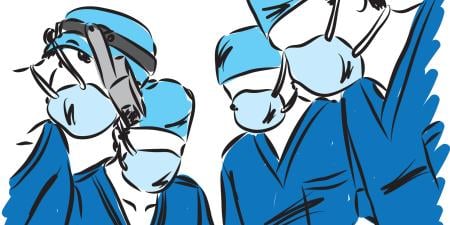I am not a surgeon. I am a philosopher by trade, but the practice of surgery fascinates me. How does a surgeon balance the usefulness of clinical evidence with the need to improvise according to unpredictable complications? When can surgery, so often associated with saving lives, be useful for care at the end of life? How much risk should research subjects be exposed to in the hopes of confirming (or disconfirming) a clinical hypothesis? What value, if any, would a regulating body like the Food and Drug Administration (FDA) have for surgery? What should surgeons do when they confront the limits of their own competence? And where are those limits, anyway? These questions and others inspired this issue of Virtual Mentor.
As usual, the clinical cases deal with specific patient-physician relationships, and each case in this issue focuses, in one way or another, on communication: a low-risk diagnostic biopsy is considered while a patient is under general anesthetic (and cannot be asked about his wishes), a patient's parent asks a third-year resident about her competence to perform the surgery, and a terminal patient requests a palliative surgery of dubious effectiveness. These should serve as reminders of the importance of communication in the relatively brief and sometimes intense interactions between patients and surgeons.
Most of the articles in the rest of the issue deal directly with the ethical means of achieving surgical ends. The usefulness of an FDA-like regulating body is considered, the limited effect of evidence-based surgery is explained, and guidelines for surgeons in the increasingly complex system of health care are suggested. The need for the Joint Commission on Accreditation of Healthcare Organizations' recent "Universal Protocol" is identified, and some clinical indications for palliative surgery are endorsed. However, our Medicine and Society feature discusses the ethical issues raised by a new challenge for the profession of surgery—surgeon participation in reality television. Finally, in the Medical Humanities essay, one man's means of confronting the predicament of being a surgeon are expressed.
I'll leave my description of this issue at that, and close by letting you know what you should learn this month:
1. Understand the obligations conferred by the consent form for surgery as they apply to surgeons and surgery residents.
2. Learn how surgery residents should respond to patients' questions about their expertise.
3. Identify the role of the surgeon in communicating with patients about palliative surgery.
4. Identify the obstacles to establishing an FDA-like agency for approval of surgical techniques and technology.
5. Understand the challenges to recognizing the limits of one's competency.
6. Understand the arguments for and against placebo controls in surgery research.



